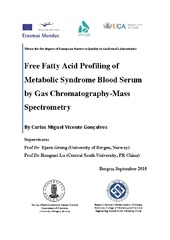Free Fatty Acid Profiling of Metabolic Syndrome Blood Serum by Gas Chromatography-Mass Spectrometry
Master thesis
Permanent lenke
https://hdl.handle.net/1956/10603Utgivelsesdato
2015-09-10Metadata
Vis full innførselSamlinger
- Department of Chemistry [433]
Sammendrag
It is estimated that 20-25% of adults in the world have metabolic syndrome (MetS), and in Chinese population this has become an important public health problem. MetS is characterized as cluster of metabolic disorders that lead to cardiovascular diseases or type 2 diabetes mellitus, and is diagnosed through the identification of three out of five possible risk factors: central obesity, increased blood pressure, increased fasting blood glucose, increased serum triglycerides and decreased HDL-cholesterol. Although the diagnosis of MetS is possible, its underlying mechanisms are yet to unveil, and new approaches are needed to explore the metabolic disorders and provide better diagnosis methods. Metabolomics has proven to be a powerful tool in biomarker identification providing metabolic information in several clinical fields. In this study, a metabolomics approach is used for free fatty acid (FFA) profiling by gas chromatography-mass spectrometry (GC-MS) of MetS serum samples of Chinese patients, and a combined chemometrics strategy using principal component analysis (PCA), random forests (RF) and canonical correlation analysis (CCA) is applied for classification and biomarker identification. After optimizing the derivatization and program temperatures for GC-MS analysis, an FFA analysis based on experimental design and internal quality control procedures is performed, with demonstrated reliability though the continuous evaluation of quality control (QC) samples. The classification results from PCA and RF confirm the good performance of the QC samples, and the later method is able to classify MetS samples and healthy control (HC) samples efficiently, with an accuracy of 0.8632. From CCA the results show a canonical correlation coefficient of 0.9015, indicating a high correlation between the clinical parameters and FFA. The most relevant clinical parameters for this correlation are shown to be HDL-C, TG and FBG, while the FFA that have the most influence in the correlation are C16:1n-9c, C20:1n-9c, and C22:4n-6c, which are identified as potential biomarkers. Results suggest that targeted metabolic profiling of FFA by GC-MS coupled with chemometrics tools such as RF and CCA are able to provide important information for biomarker discovery and disease mechanism investigation on MetS.
